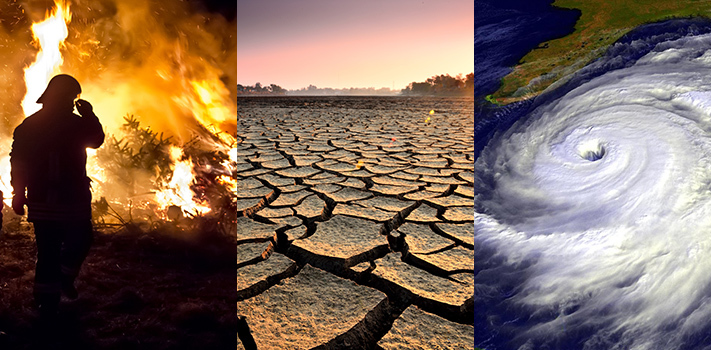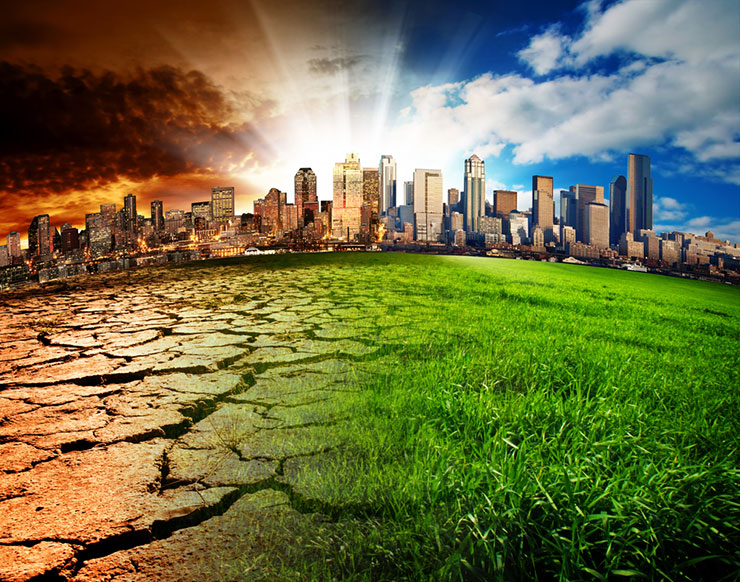
credits:nasaclimatechange
"It was the best of times, it was the worst of times" one of the most iconic quotes of English literature, today students and respected teacher I would like to share with you briefly not a Tale of Two Cities but a tale of two planets. Earth and Venus are essentially the same sizes essentially the same distance from the Sun and both have exactly the same amount of carbon the difference is that over time on earth the carbon has been trapped in the ground in the form of coal, oil, natural gas whereas on Venus most of the carbon is in the atmosphere. The difference is that on earth the average temperature is around 50 degrees whereas on Venus it is around 850 degrees not just because it's slightly closer to the Sun, Mercury is the closest to the Sun and is around three times cooler than Venus, this is indefinitely relevant to our current strategy of especially developing nations of taking as much ground-based carbon and injecting it into the atmosphere students we must responsibly consider what we will be debating over today the climate crisis is something where the consequences are not local they are global, it affects all of us and particularly as I hope to show you in the next few minutes how the developing nations themselves when Shashi Tharoor came to address the Union he stated that the industrialization of the West was based on the deindustrialization of countries like India which I strongly agree but we have to still see what's at stake, here the climate crisis is causing reduced growing seasons changing range of disease, droughts, species extinctions. Developing nations such as India should work together share technologies and strategies that can help them not mirror the same mistakes the British made in the Industrial Revolution of the 20th century
So I guess the first question is, Do the developing countries need to change it was claimed that India ranked 22nd in carbon emission index, well the last time I was in delhi which was in January I was sitting with my cousin on a veranda and she was painting the nature she's three years old, so she did like the classic thing of with her painting she left all the sky and I as a proud art lover said to her you know what why don't you just fill this whole place this white space here with color and she literally turns to me and she's said I don't have enough brown and I'm like okay the Indian sky is not blue it's gray it's opaque you can literally go outside and feel the pollution filling your lungs we think of the sky as a vast limitless space but the reality is it's just a thin shelf which continues to crack under the blunt hammer of our daily emissions the accumulated amount of manmade global warming pollution that is up in the atmosphere in that thin shell is trapping the energy equivalent of 400,000 Hiroshima class atomic bombs exploding every 24 hours 365 days a year, just picture that, that is a lot of heat and it's mostly in our oceans resulting in newer more catastrophic storms than we have ever seen before the effect is everywhere. Houston last July it rained for two days 162 billion gallons of water that's someone picking up the Niagara Falls and putting it allowing it to flow for two days on top of a very populated city, of course, there are devastating results now 14 of the 16 years that have comprised the 21st century have broken temperature records the global warming is resulting in microbial diseases from countries around the equator to spread to Western countries and higher latitudes than previously sustained temperatures that were cool enough to be hostile to these diseases while places like North America and Britain have better public health systems, women in some regions of South America are advised not to get pregnant for two years that is a red flag that's something that we need to realize is a serious problem that requires a global effort towards fixing. I'll stop talking about how terrifying the situation really is because I presume that I've scared you all enough thus far and if you're not scared then you don't really understand where we are standing right now.

credits:nasaclimatechange
we as a species the fact of the matter is from an economic perspective the cost of the climate crisis is building up central bankers like governor Mark Carney says that the vast majority of the carbon reserves are unburnable this is a great risk to global economy and if developing nations are not held to strict environmental standards now they will develop their infrastructure around unsustainable practices thus, to prevent the locking in of outdated environmental actions equal environmental standards must be enforced internationally the proposition will take offense at the word impose there is an alternative of working together with these developing nations to provide a more sustainable set of environmental standards however in the history of global warming crisis humans have been incredibly short-sighted leaders of industrializing countries will place their country's immediate priorities before the indefinite undefined future of climate change in this world this means that the cheapest fastest method of industrialization will be more preferable to one that is possibly slower but in the long term more safe for the environment as a whole we cannot afford to look locally any more we have to look at the big picture in a report by the organization for the Economic Cooperation and Development it is argued that the potential economic and social impacts of environmental degradation are particularly serious for developing countries given their dependence on national natural resources for economic growth and their vulnerability to energy food water security. Climate change and extreme weather risks populations in developing nations and are more reliant upon connected to and impacted by the environment than population in the developed world the most at-risk population for negative impacts from environmental degradation are the rural poor and developing nations proponents of equal environmental standards for developing nations argue that it is in the best interest of developing nations to put in place strict environmental policies in order to best protect their populations so I can say with the definitive stance that environmental standards indeed should be imposed but I am in no way suggesting that the West have a right to impose these standards on developing nations whereas they should just leave them to manage it alone the fact of the matter is that most of these nations lack the infrastructure and expertise to implement the standards that are likely to be set many developing countries also have established some form of governmental structure that seeks to address their environmental problems however their inherent barriers within these governments such as corruption bureaucratic inefficiencies and lack of political willingness that are preventing visible differences from being seen which is a classic case study would be my home country India and all the while our world is dying of course it is Western nations that have capitalized on industrial technology that have incurred these problems they did it first so it may well be thought of hypocritical of Western nations to demand developing nations who are struggling to improve the economies to maintain those standards that will probably hinder the economic progress but we need to tackle this problem if anything the environmental standards placed on developing countries should serve as the global baseline setting a precedent for more industrialized countries to take the lead in the path to a sustainable future it makes no sense to say the West have industrialized irresponsibly and therefore the developing nations are allowed to just go ahead and do so as well these nations have negatively contributed to the environment through high populations draining resources and heavy pollution causing havoc all over the planet climate change is a global problem and hence it is a global duty developing nations have the least incentive to commit to this which is why the West must come in and aid in any way that they can ensure that there is a safe environmental standards that are everywhere there is no denying climate change as a serious threat if we continue at the rate that we're going at Bangladesh the most crowded nation on earth is set to submerge under the oceans by the end of this century all of us sitting here today will probably still be alive to witness the fate of 150 million people as the sea reclaims the land on which they depend and doesn't matter how developed or undeveloped this country is when there is no country, we must oppose this motion the real debate here is whether or not there should be environmental standards but how they're implemented.
Abhishek Rawat
ContentWriter
@DayLightMedia




0 Comments
If you have any doubt please let me know.